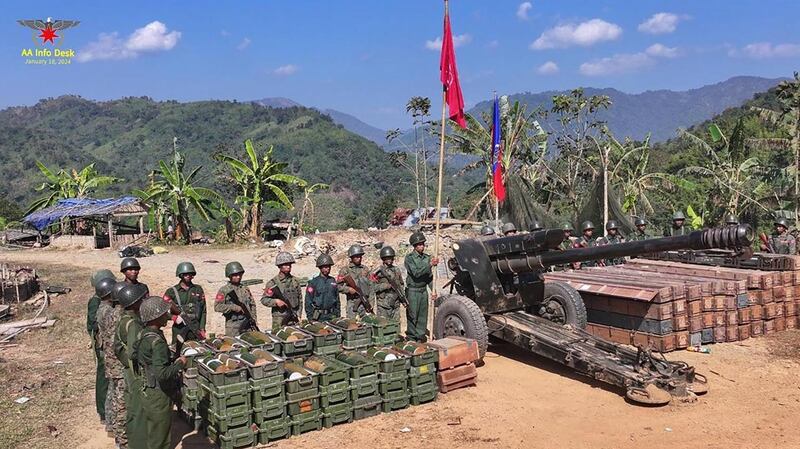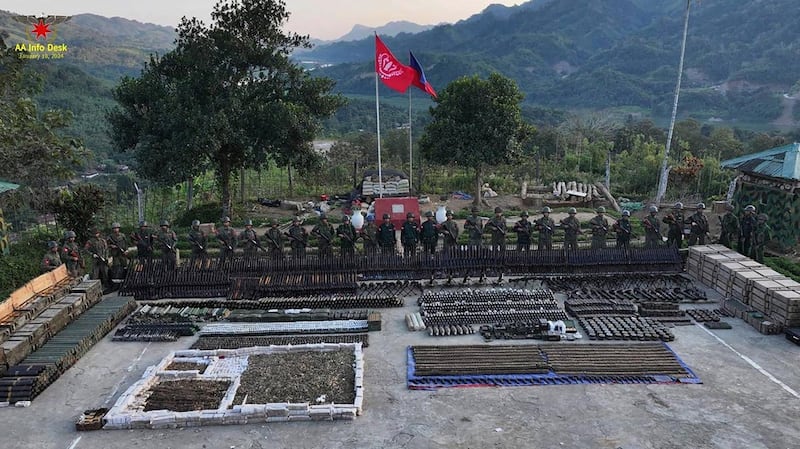More than 50,000 people, or about half of the population of Paletwa township in western Myanmar’s Chin state, have been forced to flee conflict in recent months, and are in urgent need of assistance, aid workers said Friday.
The thousands from Paletwa join what the U.N. last month estimated are more than 2.5 million people displaced by conflict in Myanmar amid intense fighting between anti-junta forces and the military, which seized power three years ago through a coup d’etat.
Clashes between the military and the ethnic Arakan Army, or AA, intensified in Chin and neighboring Rakhine state beginning on Nov. 13, and the AA said it has since seized a total of 24 military outposts and camps in the region.
On Sunday, the AA announced that it had taken control of the entire township of Paletwa, an area with a population of around 97,000 people located about 18 kilometers (11 miles) from Myanmar’s border with Bangladesh.
A day later, the military carried out an airstrike on Paletwa’s Kyee Lay village, killing four civilians, including a child, and injuring three others, residents told RFA Burmese.

Amid the fighting, more than 50,000 people have fled their homes in Paletwa’s urban areas and villages, and are in urgent need of food, shelter, medicine and other emergency assistance, according to volunteers, who spoke on condition of anonymity, citing security concerns.
“In addition to food, the displaced persons need blankets, jackets and shelters to be able to withstand the cold weather,” said one aid worker.
The worker said that an unknown number of the people who fled Paletwa had traveled across the border into India’s Mizoram state to the north of Chin state, and were reportedly receiving aid from residents and humanitarian organizations.
Cut off from family members
Another volunteer in Paletwa told RFA that the displaced had no time to bring extra supplies, like warmer clothing, as they fled, and that many have lost contact with missing family members because the junta cut off telephone and internet networks in the region.
“Some family members were separated in fierce battles,” he said. “They haven’t been able to communicate with each other while they sought safety.”
Salai Myo Htike, an official with the Paletwa Self-Administration District Council, said that those who fled are too afraid to return home amid the threat of military aerial and artillery attacks.
“Very few people will return home to urban areas … it is safer for them to take shelter at camps [for the displaced],” he said. “The flow of commodities is at risk of a halt at any time, and there’s no way to be certain for how long. Some 70-80% of people in Paletwa – whether in urban or rural areas – are likely to suffer from lack of food.”

Salai Tay Ya, the project manager of Chin Human Rights Organization, characterized the situation as a violation of human rights.
“Some [of the displaced] are outside Chin, while others are in the jungles of this state,” he said. “We have yet to receive any humanitarian aid.”
Attempts by RFA to contact Aung Cho, the junta’s spokesperson and secretary of Chin state, went unanswered on Friday.
On Thursday, the United League of Arakan announced that military airstrikes and artillery attacks had killed 81 civilians and injured about 260 others in Paletwa and parts of Rakhine state between Nov. 13 and Dec. 13.
Translated by Aung Naing. Edited by Joshua Lipes and Malcolm Foster.
